June 18, 2020
Thesaurus : 01. Conseil constitutionnel
Jan. 16, 2020
Thesaurus : Doctrine
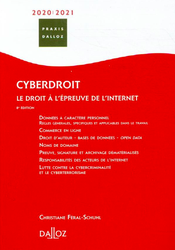
Full reference: Féral-Schuhl, C., Cyberdroit. Le Droit à l'épreuve de l'internet, Collection Praxis Dalloz, Dalloz, 8th edition, 2020, 1731p.
Read the forth of cover (in French)
Read the table of contents (in French)
Dec. 19, 2019
Interviews
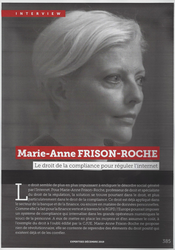
Reference Frison-Roche, M.-A., Le droit de la compliance pour réguler l'internet (Compliance Law to Regulate the Internet), Interview given in French to Sylvie Rozenfeld, Expertises, December 2019, p.385-390.
Summary. Law seems increasingly powerless to stem the social disorder generated by the Internet. For Marie-Anne Frison-Roche, Law professor and specialist in Regulatory Law, the solution is to be found in Law, and more particularly in Compliance Law. This specific Law is already applied in the banking and finance sector, or in the area of personal data. As it has done for green finance and through the GDPR, Europe could impose a compliance system which internalizes concern for the individual in large digital operators. It is up to them to put in place the means and bear the cost, such as the right to be forgotten erected by the CJEU. Marie-Anne Frison-Roche does not offer anything revolutionary, she is content to take elements of positive law that already exist and to correlate them.
Read the interview (in French)
Read the presentation of the official Report for the French Government about which this interview is given:: The contribution of Compliance Law to the Governance of Internet.
Nov. 16, 2019
Publications

The Finance Bill has proposed to the Parliament to vote an article 57 whose title is: Possibilité pour les administrations fiscales et douanières de collecter et exploiter les données rendues publiques sur les sites internet des réseaux sociaux et des opérateurs de plateformes (translation: Possibility for the tax and customs administrations to collect and exploit the data made public on the websites of social networks and platform operators).
Its content is as is in the text voted on in the National Assembly as follows:
"(1) I. - On an experimental basis and for a period of three years, for the purposes of investigating the offenses mentioned in b and c of 1 of article 1728, in articles 1729, 1791, 1791 ter, in 3 °, 8 ° and 10 ° of article 1810 of the general tax code, as well as articles 411, 412, 414, 414-2 and 415 of the customs code, the tax administration and the customs administration and indirect rights may, each as far as it is concerned, collect and exploit by means of computerized and automated processing using no facial recognition system, freely accessible content published on the internet by the users of the online platform operators mentioned in 2 ° of I of article L. 111-7 of the consumer code.
(2) The processing operations mentioned in the first paragraph are carried out by agents specially authorized for this purpose by the tax and customs authorities.
(3) When they are likely to contribute to the detection of the offenses mentioned in the first paragraph, the data collected are kept for a maximum period of one year from their collection and are destroyed at the end of this period. However, when used within the framework of criminal, tax or customs proceedings, this data may be kept until the end of the proceedings.
(4) The other data are destroyed within a maximum period of thirty days from their collection.
(5) The right of access to the information collected is exercised with the assignment service of the agents authorized to carry out the processing mentioned in the second paragraph under the conditions provided for by article 42 of law n ° 78-17 of January 6, 1978 relating to data processing, the files and freedoms.
(6) The right to object, provided for in article 38 of the same law, does not apply to the processing operations mentioned in the second paragraph.
(7) The terms of application of this I are set by decree of the Council of State.
(8) II. - The experiment provided for in I is the subject of an evaluation, the results of which are forwarded to Parliament as well as to the National Commission for Data Protection at the latest six months before its end. "
This initiative provoked many comments, rather reserved, even after the explanations given by the Minister of Budget to the National Assembly.
What to think of it legally?
Because the situation is quite simple, that is why it is difficult: on the one hand, the State will collect personal information without the authorization of the persons concerned, which is contrary to the very object of the law of 1978 , which results in full disapproval; on the other hand, the administration obtains the information to prosecute tax and customs offenses, which materializes the general interest itself.
So what about it?
Read below.
Oct. 26, 2019
Thesaurus : Doctrine
Référence complète : Dulong de Rosnay, M., La mise à disposition des œuvres et des informations sur les réseaux: Régulation juridique et régulation technique, sous la direction de Danièle Bourcier, Université Panthéon-Assas Paris II, 26 octobre 2017, 610 p.
Sept. 27, 2019
Thesaurus : Soft Law
Full reference: Information Note From the European Commission to the Permanent Representatives Committee About the Progress on Combatting Hate Speech Online Through the EU Code of Conduct, Council of the European Union, 27th of September 2019, 7p.
Sept. 27, 2019
Conferences
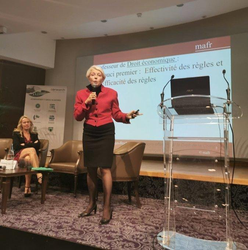
Generale Reference : Frison-Roche, M.-A., Les solutions offertes par le Droit de la Compliance pour lutter effectivement contre les contrefaçons de masse (The solutions offered by Compliance Law to fight effectively against mass counterfeiting) , in Seminar of the Association des Praticiens du Droit Droit des Marques et des Modèles (APRAM), La contrefaçon de masse : va-t-on un jour réussi à y mettre un frein ? Quelques nouvelles pistes de réflexion (How to stop the mass Counterfeiting?, some new ideas), Paris, September 27, 2019.
Read the program of the Seminar. (in French)
This conference is based on the report given to the French Government and published in July2019 : The contribution of Compliance Law to the Governance of Internet.
It is also based on the new contribution to the new edition of the Grands Arrêts de la propriété intellectuelle : "Le maniement de la propriété intellectuelle comme outil de régulation et de compliance"(in French). This publication is based on this Working Paper : The use of Intellectuel Property as a tool for Regulatory and Compliance Perspectives.
Summary : In this seminar devoted to new ways of reacting to "mass counterfeiting", the idea here is to start from the observation of an increase in the ineffectiveness of intellectual property rights - and thus of the I.P. Law. Law being a practical art, it is not a simple inconvenience, it is a central question. This can be remedied by improving the Ex Post legal process, but we can think of finding Ex Ante mechanisms. The Regulatory Law is Ex Ante, but digital world is not a sector, it is the world itself. A promising direction is therefore Compliance Law, in that it is both Ex Ante and non-sectoral. The contribution shows how Compliance Law is already useful, could be developed and how it could be applied so that these specific rights could be effectively protected in a digital world, where for the moment counterfactors have in fact the means to ignore them.
See the slides. (in French)
Sept. 8, 2019
Blog

I go. In accordance with the European Regulation (GDPR) transposed into French legal system, the site informs that there is possibility for the user to accept or refuse the use of their personal data for the benefit of "partners".
If they continue reading, the user is supposed to accept everything, but they can click to "customize".
I click: there I find two options: "accept everything" or "reject everything". But the "reject all" option is disabled. It is only possible to click on the "accept all" option.
It is stated in a text, which can not be copied, that these "partners" can use my data without my consent and for purposes that they do not have to inform me. But, again, these things I can "refuse everything". Here again the "reject all" mention exists but the fonctionality is not active, while the mention "accept all" is an active fonctionality.
While believing to read a free article on the "right of the trees".
At the end, I do not read this article, since I did not click on the only active buttons: "accept everything".
In exchange for a whimsical article about trees and their rights, or creams to be always young, or celebrities who change spouses, or about so-called tests to find what king or queen you should be if the all recognized all your merits, etc.
Proposed on the digital news feed by unknown sites; in partnership with foreign companies that you will never reach.
And mass-viewed by Internet users who are also told that "consent" is the proven solution for effective protection ....
While these are just panels hastily built by new Potemkins ...
Updated: Sept. 5, 2019 (Initial publication: April 30, 2019)
Publications
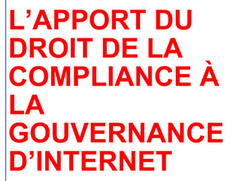
🌐 follow Marie-Anne Frison-Roche on LinkedIn
🌐subscribe to the Newsletter MAFR Regulation, Compliance, Law
____
► Full Reference: M.-A. Frison-Roche, L'apport du Droit de la Compliance dans la Gouvernance d'Internet (The contribution of Compliance Law to the Internet Governance), Report asked by the French Government, published the 15th of July 2019, 139 p.
___
► Report Summary. Governing the Internet? Compliance Law can help.
Compliance Law is for the Policy Maker to aim for global goals that they require to be achieved by companies in a position to do so. In the digital space built on the sole principle of Liberty, the Politics must insert a second principle: the Person. The respect of this One, in balance with the Freedom, can be required by the Policy Maker via Compliance Law, which internalises this specific pretention in the digital companies. Liberalism and Humanism become the two pillars of Internet Governance.
The humanism of European Compliance Law then enriches US Compliance law. The crucial digital operators thus forced, like Facebook, YouTube, Google, etc., must then exercise powers only to better achieve these goals to protect persons (against hatred, inadequate exploitation of data, terrorism, violation of intellectual property, etc.). They must guarantee the rights of individuals, including intellectual property rights. To do this, they must be recognized as "second level regulators", supervised by Public Authorities.
This governance of the Internet by Compliance Law is ongoing. By the European Banking Union. By green finance. By the GDPR. We must force the line and give unity and simplicity that are still lacking, by infusing a political dimension to Compliance: the Person. The European Court of Justice has always done it. The European Commission through its DG Connect is ready.
► 📓 Read the reporte (in French)
📝 Read the Report Summary in 3 pages (in English)
📝 Read the Report Summary in 6 pages (in English)
____
► Plan of the Report (4 chapters): an ascertainment of the digitization of the world (1), the challenge of civilization that this constitutes (2), the relations of Compliance mechanisms as it should be conceived between Europe and the United States, not to mention that the world is not limited to them, with the concrete solutions that result from this (3) and concrete practical solutions to better organize an effective digital governance, inspired by what is particularly in the banking sector, and continuing what has already been done in Europe in the digital field, which has already made it exemplary and what it must continue, France can be force of proposal by the example (4).
____
📝 Read the written presentation of the Report done by Minister Cédric O (in French).
____
💬 Read the interview published the 18 July 2019 : "Gouvernance d'Internet : un enjeu de civilisation" ( "Governing Internet: an Issue of Civilization"), given in French,
📻 Listen the Radio broadcast of July 21, 2019 during which its consequences are applied to the cryptocurrency "Libra" (given in French)
🏛 Presentation of the Report to the Conseil Supérieur de l'Audiovisuel- CSA (French Council of Audiovisual) on Septembre 5, by a discussion with its members presentation (in French)
💬 Read the Interview published the 20 December 2019 : "Le droit de la compliance pour réguler l'Internet" ("Compliance Law for regulate Internet"), given in French
____
read below the 54 propositions of the Report ⤵️
Nov. 13, 2018
Thesaurus : Doctrine
Discours d'Emmanuel Macron, président de la République, au Forum "Gouvernance Internet", Unesco, 13 novembre 2018.
Lire le Discours. Compl
July 11, 2018
Thesaurus : Doctrine

Complete reference : Randell, Ch., How can we ensure that big Data does not make us prisoners of technology ?, Reuters Newsmaker event, London, 2018.
June 4, 2018
Thesaurus : Doctrine

Référence complète : Chaltiel, F., La protection des données personnelles. À propos de l'entrée en vigueur du règlement général de protection des données, in Petites Affiches, Lextenso, juin 2018, pp. 6-22.
Le 25 mai 2018 doit marquer le début d'un nouvel âge des droits numériques de chacun. Le règlement général de protection des données, dont la préparation remonte à plusieurs années, doit en effet entrer en vigueur en mai 2018.
Il tire les conséquences de plusieurs décennies de progrès du numérique et vise à assurer, dans un cadre technique inédit à l'échelle de l'histoire de la communication, une protection renforcée des données.
Les obligations sont nombreuses, il n'est pas certain que les acteurs concernés soient en mesure de garantir l'ensemble de ces droits dans le délai imparti. Le nouveau droit fondamental de la protection des données personnelles est sans doute un des défis juridiques majeurs des années à venir pour nos sociétés.
May 15, 2018
Thesaurus : Doctrine

Référence complète : Moreaux, A., Comment se conformer au RGPD ?, in Affiches Parisiennes, mai 2018, pp. 1-3.
L'échéance du fameux Règlement général sur la protection des données approche. Pour Mounir Mahjoubi, secrétaire d'État au Numérique, « 2018 est l'année du RGPD » qui va entraîner un « véritable choc de sécurité » sur la toile. La mise en conformité avec le nouveau règlement européen sur le digital qui entre en vigueur le 25 mai est une question centrale pour les entreprises.
Dec. 7, 2017
Interviews
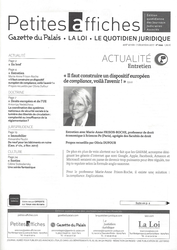
Référence complète : FRISON-ROCHE, M.-A., Il faut construire un dispositif européen de compliance, voilà l'avenir !, in Actualité/Entretien, Petites Affiches, propos recueillis par Olivia DUFOUR, n° 244, 7 déc. 2017, pp. 4-6.
Entretien donné à propos de la sortie de l'ouvrage Régulation, Supervision, Compliance.
Réponse aux questions suivantes :
- Quels sont les buts que vous assignez à la Compliance ?
- Que signifient ces deux concepts que vous introduisez : service public mondial et buts monumentaux ?
- Que devient l’État face à une entreprise globale ?
- Que pensez-vous du lanceur d'alerte ?
- Comment est affectée la relation entre l'Europe et les États-Unis ?
- Par la Compliance, les entreprises ne vont-elles pas gouverner le monde ?
______
Nov. 27, 2017
Thesaurus : Doctrine

► Référence complète : Association française pour le nommage Internet en coopération (Afnic), Peut-on casser l'internet ?, dossier thématique, 2017, 8 p.
____
________
Aug. 23, 2017
Thesaurus : Doctrine
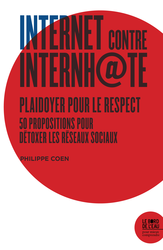
Référence générale : Coen, P., Internet contre internh@te : Plaidoyer pour le respect. 50 propositions pour détoxer les réseaux sociaux, coll. "Pour mieux comprendre", Le bord de l'eau, 2017, 188 p.
Lire la quatrième de couverture.
Jan. 5, 2017
Blog

Le juge a le pouvoir de "qualifier", c'est-à-dire de donner à une situation de fait ou de droit sa nature, quelle que soit les termes qu'ont utilisé les personnes. Cet office du juge est exprimé par l'article 12 du Code de procédure.
Ainsi, les réseaux sociaux utilisent le terme "amis".
Ce terme a des conséquences juridiques très importantes. En effet, en droit les relations amicales supposent par exemple un désintéressement, l'ami travaillant gratuitement au bénéfice de l'autre. Mais déjà la Cour d'appel de Paris à laquelle FaceBook avait raconté cette fable, se présentant comme le constructeur désintéressé uniquement soucieux de permettre aux internautes de nouer des liens d'amitié, avait répondu en février 2016 que le souci premier de cette entreprise florissante était bien plutôt le profit. Comme on le sait, le profit et la gratuité font très bon ménage.
De la même façon, une relation amicale suppose un souci que l'on a de l'autre, une absence de distance, une certaine chaleur. En cela, une relation amicale est toujours partiale.
C'est pourquoi logiquement lorsqu'un avocat fût l'objet d'une procédure disciplinaire devant le conseil de l'ordre, il demanda la récusation de certains de ces confrères siégeant dans la formation de jugement en évoquant le fait qu'ils étaient "amis" sur FaceBook, ce qui entacherait leur impartialité, les instances disciplinaires étant gouvernées par le principe subjectif et objectif d'impartialité.
Par un arrêt du 5 janvier 2017, la deuxième chambre civile de la Cour de cassation, comme la Cour d'appel, refuse de suivre un tel raisonnement.
En effet, celui-ci n'aurait de sens que si en soi les personnes en contact sur un réseau social étaient effectivement des "amis". Mais ils ne le sont pas. Comme le reprend la Cour de cassation dans la motivation de la Cour d'appel, "le terme d’ « ami » employé pour désigner les personnes qui acceptent d’entrer en contact par les réseaux sociaux ne renvoie pas à des relations d’amitié au sens traditionnel du terme et que l’existence de contacts entre ces différentes personnes par l’intermédiaire de ces réseaux ne suffit pas à caractériser une partialité particulière, le réseau social étant simplement un moyen de communication spécifique entre des personnes qui partagent les mêmes centres d’intérêt, et en l’espèce la même profession".
Ce sont des personnes qui ont des choses en commun, ici une profession, mais cela peut être autre chose, éventuellement un sujet de dispute, même si les études récentes montrent que les personnes se rejoignent plutôt sur des opinions communes.
Mais il ne s'agit tout d'abord que d'un renvoie à une "appréciation souveraine" des faits. Ainsi, si la personne avait apporté la preuve d'une opinion partagée sur le réseau montrant un préjugé - même abstraitement formulé - lui étant défavorable, le résultat aurait été différent. De la même façon, comme cela est souvent le cas, des liens personnels se nouent, par des photos plus personnelles, des échanges plus privés, etc., alors le résultat aurait été différents.
Ainsi, les contacts sur un réseau sociaux ne sont pas en soi des "amis", mais ils peuvent l'être ou le devenir. L'enjeu est donc probatoire. Montrer un lien virtuel n'est pas suffisant, mais c'est une première étape, qui peut mener à la démonstration, qui continue de reposer sur le demandeur à l'instance, d'un lien personnel et désintéressé, ce qui renvoie à la définition juridique de l'amitié, excluant notamment l'impartialité.
Nov. 19, 2016
Interviews
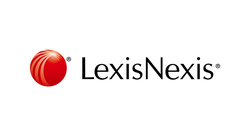
Référence complète : Frison-Roche, M.-A., Pour réguler l'espace numérique : la solution de "l'interrégulation" !, entretien, Revue Communication Commerce Électronique, nov. 2016, p.8.
Cet interview a été donné à l'occasion de l'ouvrage Internet, espace d'interrégulation
Il aborde trois questions :
- la définition de l'interrégulation,
- les justifications de l'interrégulation en matière numérique
- les conditions de l'effectivité de l'interrégulation en matière numérique
July 7, 2016
Interviews

Référence complète : Frison-Roche, M.A., Les droits des personnes, Internet et la CNIL, Dalloz - Etudiants, 7 juillet 2016.
Les questions posées ont trait à :
- la décision de la CNIL, Numericable, quant à la nature de l'obligation des opérateur numériques de transmettre des informations aux autorités ;
- la nature de cette obligation ;
- la portée du "droit à l'oubli", tel qu'il ressort de l'arrêt Google Spain de la CJUE ;
- les enseignements de la querelle entamée par Google sur l'espace d'effectivité du déréférencent impliqué par ce droit à l'oubli.

Updated: June 18, 2016 (Initial publication: Nov. 8, 2015)
Publications

This Working paper will be used to support an French written article to be published in a book, set in the media/assets/couvertures/couverture-
This working paper was the basis for intervention in the symposium organized by the internet-espace-/">Journal of Regulation,
View the slides used as support at the conference (in French).
____
After emphasizing that the concept of "data" is uncertain, the first perspective is to draw the regulatory consequences of the fact that what is often referred to as the "object" of the data item (the person, the company for financial data, the economy for rating data, etc.), is only its source, "underlying", the data which is manufactured by a company : the real objet of the data is its purpose being the use for which the data is intended. The data is independent its underlying, is consolidated in the affected masses, takes an economic value based on the desires that have users, becomes available outside of time and space in the digital. This implies a specific
But the data is also the Janus of digital because new black gold, pure financial instrument, immaterial by nature, the data also keep a record of people, the underlying that would protect, that we would like inseparable, or the structure that one would want legitimately to attack thank to the new mechanism of
In addition, any
April 22, 2016
Editorial responsibilities : Direction of the collection "Regulations & Compliance", JoRC & Dalloz
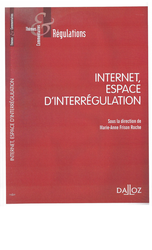
Complete references : Frison-Roche, M.-A. (dir.), Internet, espace d'interrégulation, Serie "Régulations", coll. "Thèmes & Commentaires", Dalloz, Paris, 2016.
Read the presentation of the book (written in French).
Read the presentation of the authors of the contributions (written in French)
"Regulate the Internet".
Some argue that any regulation is contrary to the nature of digital. Others argue that this is indispensable, for its economic deployment and for public freedoms. Internet renews conceptions and practices. Notably those of the Law of the Regulation. Indeed, the Internet makes it possible to offer and obtain services that are in often regulated sectors: financial, audiovisual, healthcare, gaming. Moreover, they converge in new objects: the connected objects.
Often described as a "legal desert", digital appears as a kind of jumble of systems of various regulations that overlap, deform and contradict each other. In reaction, an "interregulation", de facto or de jure, in law more or less flexible, is in the process of being established. Who will be the Regulator: The States? The judge? The Internet users?
The future is open.
The book first determines the "Interregulation Needs" and then describes and conceives solutions for the interregulation of the digital space.
Read the presentation of the two articles written by Marie-Anne Frison-Roche:
Thinking the world from the notion of "data"
To draw the regulatory consequences of a rethinked world from the notion of "data"
The working papers which are the base of these articles are written in English.
April 22, 2016
Publications

Référence complète : Frison-Roche, M.-A., Les conséquences régulatoires d'un monde repensé à partir de la notion de "donnée", in Frison-Roche, M.-A. (dir.), Internet, espace d'interrégulation, série "Régulation", Journal of Regulation - Dalloz, 2016, p.183-207.
Il est à corréler à un article publié dans le même ouvrage : Penser le monde à partir de la notion de "donnée".
Cet article s'appuie sur un working paper : lire le working paper.
April 22, 2016
Publications
📝Rethinking the world from the notion of "data" (Penser le monde à partir de la notion de "données")

Référence complète : Frison-Roche, M.-A., Penser le monde à partir de la notion de "donnée", in Frison-Roche, M.-A. (dir.), Internet, espace d'interrégulation, série "Régulation", 2016, p.7-16.
English summary :
Law is a reconstruction of the world through definitions and categories, expressed in words, to which are imputed rules. There is always a share of invention in Law, articulated to a share of fidelity to the concrete world that it retranscribes, a combination enabling Law to regulate the latter.
Law is put in difficulty by what the term "data", quite new, is not easy to define. The fact that it is strangely formulated in Latin to show that there is plurality, the data, before associating it with an English adjective when there are many, the "big data", does not advance us more on what a "data" is. Law is a practical art that works well only if it manipulates categories whose definition is mastered.
This is why, in a first stage, we must recognize the uncertainties of the very notions of "data" (I), in order to orientate the adequate rules in the second step towards what is a given, namely a "pure" value in our consumer information society (II).
This article is linked to another article published in the same book : Les conséquences régulatoires d'un monde repensé à partir de la notion de "donnée" ("the regulatory consequences of a word redesigned from the notion of "data")
March 31, 2016
Conferences
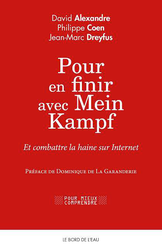
David Alexandre, Philippe Coen et Jean-Marc Dreyfus ont publié Pour en finir avec Mein Kampf et combattre la haine sur Internet.
Un débat est organisé à la Librairie Lamartine autour de l'ouvrage.
A l'ère numérique, un combat contre ce livre fait sourire certains. D'autres se mobilisent, notamment les éditeurs, parce qu'ils savent que le monde virtuel n'a pas fait disparaître les personnes et les livres. Pourtant, la haine dont ce livre ruisselle coule à flot grâce à la capillarité numérique et ce livre retrouve une nouvelle jeunesse, pour laquelle la tombée dans le domaine public n'est accessoire.
Faut-il ne rien faire, sous prétexte qu'on ne peut pas beaucoup ?
L'engagement dans une lutte doit-elle ses mesurer à l'aune de sa probabilité de succès et de l'ampleur de ses moyens par rapport aux moyens de l'objet combattu ?
Si l'on pense ainsi, alors il n'y aurait jamais dû avoir de Droit. Celui-ci a toujours perdu d'avance, face au crime, au désir, à la lâcheté et à l'indifférence. Situation de fait qui désespéra tant Sade.
Si l'on reprend la situation nouvelle constituée par le numérique, il y a tout d'abord ce qu'il est usuel d'appeler les "géants du numérique" sur lesquels Philippe Coen semble beaucoup compter.
Il y a aussi les personnes elles-mêmes. Dans lesquelles il ne faut pas tant désespérer. La haine n'est pas la choses la mieux partagée du monde. Non.
C'est la peur et la fatigue qui peuvent l'être, ce qui est différent. Ainsi, l'initiative "Respect zone" qui fait que chacun est maître chez soi, conception si classique et si française du Droit, est adéquate pour, non certes "en finir", mais mettre des bornes. Pour reprendre le vocabulaire du Droit romain.

Updated: March 12, 2016 (Initial publication: Nov. 7, 2015)
Publications

Law is a reconstruction of the world through definitions and categories, expressed in words, to which are imputed rules. There is always a share of invention in Law, articulated to a share of fidelity to the concrete world that it retranscribes, a combination enabling Law to regulate the latter.
Law is put in difficulty by what the term "data", quite new, is not easy to define. The fact that it is strangely formulated in Latin to show that there is plurality, the data, before associating it with an English adjective when there are many, the "big data", does not advance us more on what a "data" is. Law is a practical art that works well only if it manipulates categories whose definition is mastered.
This is why, in a first stage, we must recognize the uncertainties of the very notions of "data" (I), in order to orientate the adequate rules in the second step towards what is a given, namely a "pure" value in our consumer information society (II).
Read the article written in French on the basis à this working paper